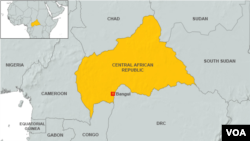International peacekeepers in the Central African Republic have started vetting the fractured nation’s army -- known as the FACA -- to try to exclude suspected criminals. The mission is starting with the first battalion to be deployed on active service as part of rebuilding the country.
The French military mission, known as Operation Sangaris, is working with the U.N. mission MINUSCA and with the national authorities to screen each soldier in the first FACA battalion. The goal is to ensure that none of them have committed human rights violations.
The FACA fell apart during the civil conflict over the past two years. Many soldiers joined the mostly Muslim ex-Seleka rebels and the mostly Christian anti-Balaka militias - both of which carried out massacres and committed many other abuses.
The new battalion is the first that will be deployed on active service and it's being vetted this month. So far 300 men are being screened with another 200 to be vetted next month - bringing the battalion up to full strength.
VOA asked the senior French officer overseeing the process, Colonel Charles Michel, how it works.
"At the moment," he said, "the Central African judicial system is disorganized. So the verification is based on, first, declarations by the soldiers themselves that they have not committed crimes or violations of international humanitarian law and that they will serve the nation well."
However, that is not the only basis for inclusion in the battalion. Each soldier is interviewed by a board of Sangaris, MINUSCA and national authorities. And the peacekeepers check each soldier against their own intelligence on war criminals and rights abusers.
The colonel said 2% of the men screened so far have been excluded on suspicion of human rights violations.
It has been decided that the battalion will be based in the capital Bangui, and its job will be to guard sites of vital national interest -- probably including the presidency and the port on the river Oubangui, said Michel.
He said the list of these sites of vital national interest will be agreed by a committee consisting of international forces and government representatives.
There is plenty more work to do before the Central African Army is fully screened and ready to operate to capacity. Michel said there is still great uncertainty as to the army's size, for example.
He said the U.N. is doing a lot of work to verify the number of FACA personnel and it has mandated a non-governmental organization, the Swiss De-Mining Federation, to create a database which will allow for better management of the FACA’s human resources.
Officially there are supposed to be about 7,000 FACA personnel, whose salaries are paid out of donor funding.
The colonel did not mention that any soldiers were excluded as under age. The U.N. Children’s Fund says the number of underage combatants in the C.A.R.’s armed groups has risen in the past two years from 2,500 to between 6,000 and 10,000.




